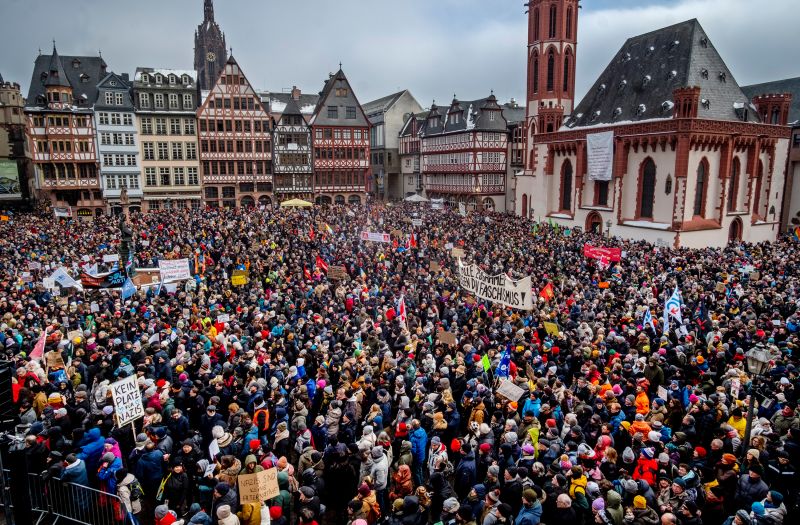Huge crowds of protesters have descended on cities in Germany as calls for a ban on the far-right Alternative for Germany (AfD) gain momentum.
Tens of thousands had already braved sub-zero temperatures during the week to protest against the party after it emerged senior AfD members discussed a plan to deport migrants en masse in revelations that have been compared to the Nazi era.
Public anger continued throughout weekend. Crowds of up to 35,000 gathered in Frankfurt on Saturday under the banner “Defend democracy – Frankfurt against the AfD,” while a similar number of people turned out in the northern city of Hanover, the German newspaper Der Spiegel reported. Significant crowds were also seen in Stuttgard, Dortmund and Nuremberg.
On Sunday, tens of thousands of people again took to the streets, with rallies in Berlin, Munich and Cologne, as well as in the cities of Leipzig and Dresden, which are considered more traditional AfD voting strongholds, according to Reuters.
Nearly 100,000 people attended the rally in Munich at its peak on Sunday, local police said. Nearly 30,000 people gathered at the beginning of the Berlin protest, with more people arriving as the event continued, according to Reuters.
German Chancellor Olaf Scholz has welcomed the protests as “good and right.” In a video message issued Friday night, Scholz said that he tries to imagine “how the more than 20 million citizens who have a history of migration feel” about the deportation plan.
A ‘master plan’ for deportation
Many Germans are outraged by reports that senior members of the AfD discussed a ”master plan” for the mass deportation of German asylum-seekers and German citizens of foreign origin during a meeting late last year.
The gathering of AfD members, neo-Nazis and other far-right extremists took place at a lakeside hotel outside the city of Potsdam on November 25.
It did not come to light until January 10, when the meeting was revealed by the investigative journalism network Correctiv, sparking a wave of protests across Germany.
In its report uncovering the private meeting, Correctiv wrote: “The events that will occur today at the hotel Landhaus Adlon will seem like a dystopian drama. Only they’re real.
“And they will show what can happen when the frontmen of right-wing extremist ideas, representatives of the AfD and wealthy sympathisers come together.”
“The meeting was meant to remain secret at all costs,” the report said.
The AfD denies that such plans are part of its policy and the AfD leadership has sought to distance itself from the gathering, calling it a “private event and not an AfD party event.”
However, the idea of a “mass deportation plan” was openly supported by one AfD representative in the state of Brandenberg. René Springer took to his account on X to write: “We will return foreigners to their homeland. Millions of times. This is not a secret plan. It’s a promise.
“For more security. For more justice. To preserve our identity. For Germany.”
Many have pointed out that the mass deportation plan is evocative of the Nazi era from 1933 to 1945, when millions were transported against their will to concentration, forced labor and extermination camps.
“The plans to expel millions of people are reminiscent of the darkest chapter in German history,” Christian Dürr, parliamentary group leader of the neoliberal Free Democrats Party (FDP), wrote on X.
“I saw a banner yesterday which said, ‘Now is the time to show what we would have done instead of our grandparents.’
“There are parallels. It’s definitely time to take a stand against the right and start opposing the anti-democratic forces.”
She added that members of the AfD had been “making concrete plans to deport millions of people from Germany. We clearly see that these plans are inhumane and an attack on our democracy and the rule of law and on many of our fellow citizens.”
He continued: “This meeting in Potsdam has shown once again how urgent it is that not only politicians speak out, but that a strong signal is sent from the middle of society to defend democracy and our state.”
Asked whether he thought the protests would encourage people to stop voting for the AfD, Abaci was hopeful. “There is a core group of AfD voters who vote for this party out of conviction, but there are of course also voters who have voted for AfD out of protest.
“But now is the time for them to wake up and realize that we are not dealing with a protest party, but with a right-wing extremist party. Our rally could help these people to finally wake up.”
Rallies in Potsdam Sunday were attended by Scholz, the chancellor, as well as Foreign Minister Annalena Baerbock.
Baerbock said she was there as someone who “stands for democracy and against old and new fascism,” while Scholz this week thanked the demonstrators for taking to the streets “against racism, hate speech and in favour of our liberal democracy.”
Paving a way to outlaw the AfD could prove difficult and risks backfiring. German politicians this week discussed the possibility of calling on the constitutional court to implement a ban.
The German constitution says that parties that seek to undermine the “free democratic basic order” should be deemed unconstitutional.
German Vice Chancellor Robert Habeck told the magazine Stern that “the damage that a failed attempt would cause would be massive.”
“Which is why if a case is put, it would have to absolutely 100% stand up in court. It’s something you have to consider very carefully,” he adds.
Many see public displays of backlash against the AfD as crucial, as the far-right party has recently enjoyed record-high polling and is expected to make major gains in regional elections in the eastern states of Thuringia, Saxony and Brandenburg this year.
According to a recent survey published by opinion research institute Forsa, the AfD is currently polling above 30% in all three states – comfortably higher than its rivals.
Nadine Schmidt reported from Berlin and Sophie Tanno wrote in London.







































